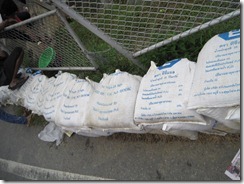I read a book review yesterday of White Man’s Burden: Why the West’s Efforts to Aid the Rest Have Done So Much Ill and So Little Good by William Easterly, a book that asserts that development assistance has been ruthlessly squandered and is highly critical of how development aid is disbursed by wealthy nations and used by developing nations. The book’s author believes that rather than having large-scale, top-down aid projects that ultimately fail, development must from the bottom-up, particularly through micro-credit projects.
The book’s premise got me thinking, as I occasionally do, about grandiose ideas that are idealistic and perhaps achieveable, although not practical given the current global geopolitical situation. I thought about South Korea’s dramatic rise as an economic power and what it could do by itself to empower developing nations to pursue economic development and political reform. The Republic of Korea Government acknowledges that its development assistance efforts thus far have been insufficient, although it has stated that it plans to increase aid substantially in the coming years. South Korea’s total 2004 official development assistance (ODA) efforts amounted to just 0.06% of the country’s total gross domestic product (GDP), a sum far below 0.25% mandated by the United Nations’ Millennium Development Goals, of which Korea is a signatory (the U.S. also falls short at 0.22% of GDP). When South Korea’s total aid to North Korea is added to its ODA (aid to the DPRK is considered domestic aid rather than ODA), Korea’s total 2004 DPRK/ODA figure rose to about .11% of GDP. This is still far below UN mandates. The Republic of Korea Government is working on a plan to increase ODA but has not announced any specific goals.
Pondering this book and Korea’s rapid economic rise, I came up with a concept I call "spoke and mirrors," the idea that OECD nations such as Korea should target and administer development aid to one or more peer nations rather than simply remitting aid to an international body that redistributes it through wide-scale development organizations (the Organisation for Economic Cooperation & Development, or OECD, represents the world’s 30 largest economies). In essence, developed nations such as South Korea could effectively "adopt" one or several nations to mentor in the development process, rather than distribute aid to a gaggle of nations. Mentoring nations such as Korea could become "spokes" in the ODA effort, and mentored nations could "mirror" the economic success of nations such as Korea in an effort to improve their own economic status. By focusing on specific nations, all members of the OECD can concentrate on institution-building in developing nations rather than simply spreading the wealth to large-scale development projects.
While Korean aid disbursement remains largely focused on South, Southeast, and East Asia, the list of recipient nations of Korean aid is quite lengthy. Korea’s three largest ODA recipients in 2004 were Indonesia, Iraq, and Afghanistan. These disbursements, made principally by KOICA through the Korea Eximbank’s EDCF, largely followed world events (war and the Tsunami). However, with Korea seeking to increase ODA, it has given itself an excellent opportunity to use that money to achieve targeted development. Korea could use this increase and disburse much of it to strategic partners such as Indonesia or Vietnam to further assist them with economic development. Likewise, Australia could focus on nations such as East Timor and Fiji. The scale and scope of mentoring relationships would depend on the size and historical relationship between of the nations involved. For example, former European colonial powers could focus their efforts on former colonies, just as Great Britain has tried to maintain relations with its former colonies through the British Commonwealth.
Call me crazy, but it might be an idea that might just work.



